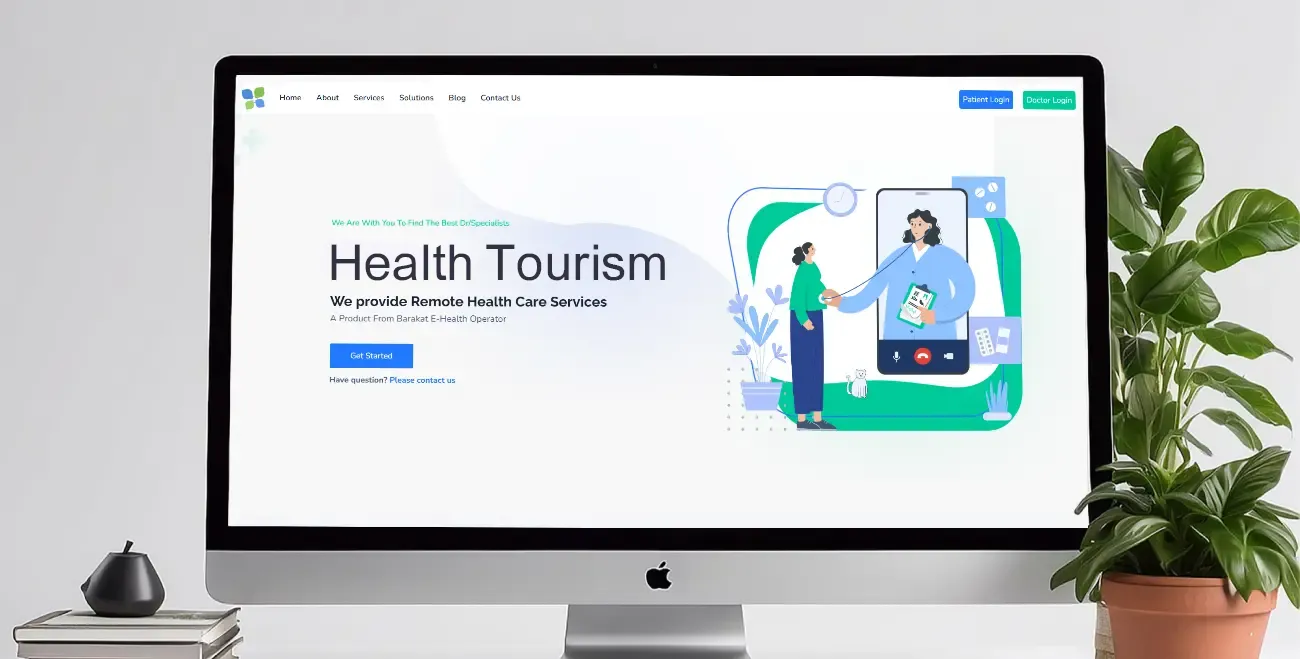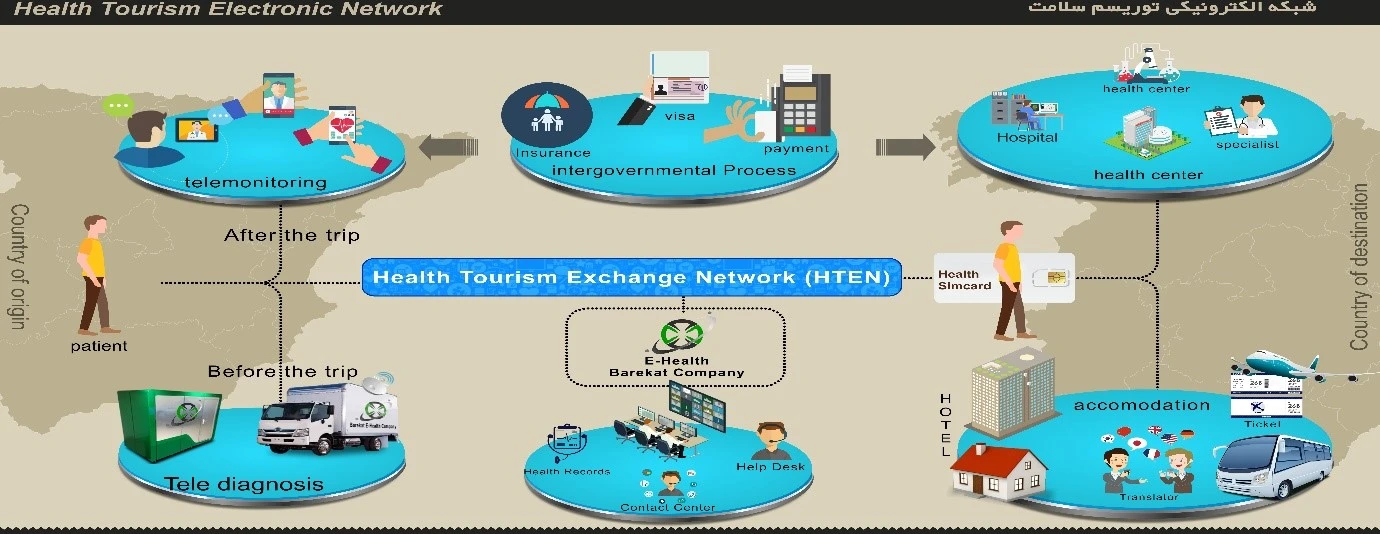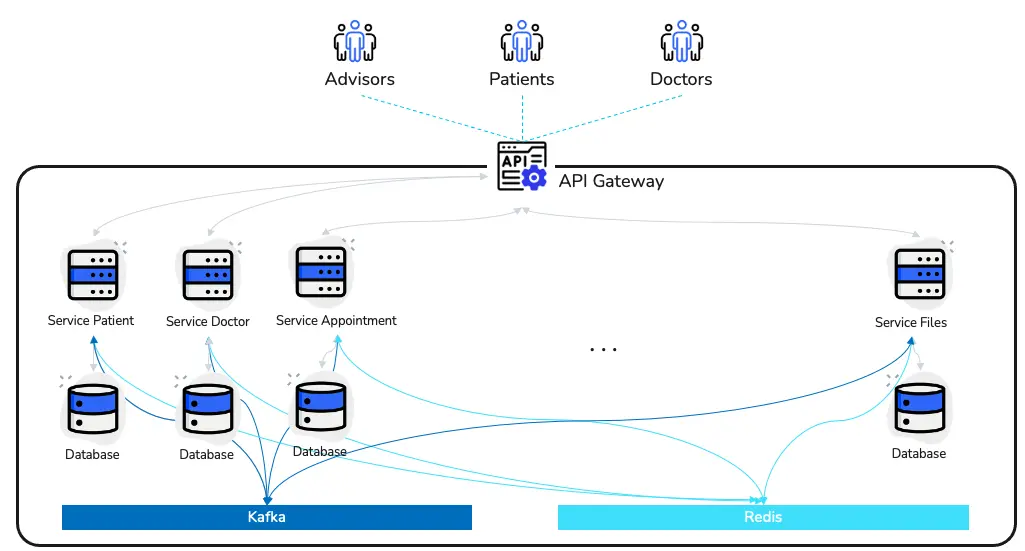


The Electronic Health Tourism Network is designed for patient consultations and remote health advice, as well as providing various services such as flight and hotel reservations, scheduling appointments with relevant doctors, booking hospital beds, monitoring patients after treatment, and more for the health tourism network. These services will be provided through the installation of infrastructure in both the destination country and the origin country, such as display hardware at the doctor's location and communication infrastructures to integrate the network elements (doctor, source hospital, destination hospital, Barakat Electronic Health Company, etc.).
The schematic representation below shows the services provided to health tourists through the electronic health tourism network. As shown, the patient is initially consulted through the Dura Health equipment, and if treatment processes are required, all prerequisites are fulfilled by Barakat Electronic Health Company within this project. This includes issuing an insurance policy, obtaining an Iran visa, issuing a credit card, scheduling appointments with doctors and hospitals, booking accommodation, and providing flight tickets and other transport tickets. Finally, after the treatment process, the patient returns to their home country, and their recovery is monitored through available hardware.
The Health Tourism Platform operates on the web platform and employs standard web protocols, semantic web, security, and data transfer at all stages. Currently, the system includes features such as entering medical information, consultation stages, medical visit history, data aggregation, and the generation of management statistics and charts.

Dura Health services include remote medical services such as diagnosis, data exchange, monitoring, screening, and consultation through information technology, provided by specialized doctors. This includes sharing medical data and remote diagnosis with medical devices installed at Dura Health stations. The system helps doctors diagnose and treat diseases without being physically present, prescribing treatments based on Dura Health services, and exchanging health data, including blood pressure, blood sugar, body fat, ECG and EEG data, body temperature, heart and lung sounds, and imaging data such as endoscopy, CT scans, and MRIs. This enables remote diagnosis and treatment for patients in remote and underserved areas.
The Dura Health system, through online video consultations and connections with medical devices, allows for face-to-face and remote consultations between doctors and patients with real-time data exchange. Specialized medical device modules installed at health stations offer remote consultations in dermatology, psychology, pathology, cardiology, ophthalmology, and colposcopy, among many other services.
The Health Tourism section is an integrated information network between patients in the source country and medical and health centers in the destination country. This network allows for remote diagnostic services before traveling to the destination country and provides post-treatment care from the origin country. The network also includes an Accreditation Center, which provides the necessary framework for offering medical, health, hotel, and tour services. Additionally, insurance, visa processes, and payments are part of the network's benefits.
In health tourism, patients can be remotely examined at home, and the disease is diagnosed through Dura Health equipment (tele-diagnosis). If the patient needs surgery or in-person treatment, the Electronic Health Network will handle all aspects of the patient's transfer, including visa processing, hotel reservations, transfers, and more, ensuring the patient is moved to the hospital in the destination country. After the patient returns home following treatment, they can be monitored using Health Mobile equipment until complete recovery.
Additional services include visa processing, necessary insurances during the stay in Iran, credit card issuance, electronic payments in Iran, hotel reservations, flight bookings, and other wellness and leisure facilities for health tourists. Health SIM cards and mobile health equipment for Iranians and health tourists are also provided for continuous, real-time health monitoring.
An electronic database is created for archiving health information, ensuring access to necessary data by the individual and their doctor at any time and from any location.
This system is developed through 19 backend services and 4 frontend services with a designed architecture.
